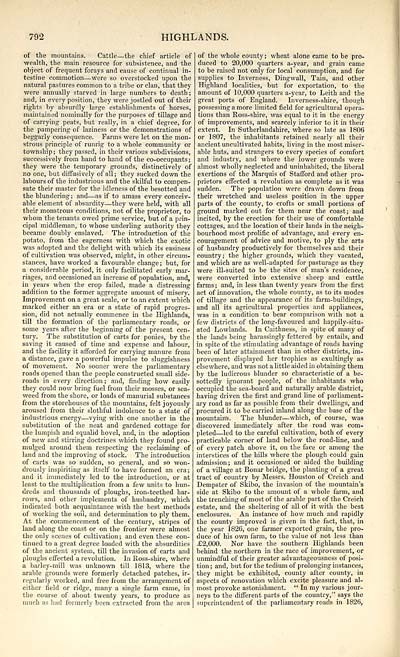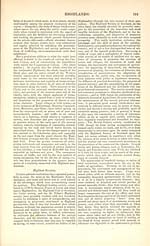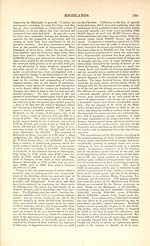Topographical, statistical, and historical gazetteer of Scotland > Volume 1
(892) Page 792
Download files
Complete book:
Individual page:
Thumbnail gallery: Grid view | List view

792
HIGHLANDS.
of the mountains. Cattle — the chief article of
wealth, the main resource for subsistence, and the
object of frequent forays and cause of continual in-
testine commotion. — Were so overstocked upon the
natural pastures common to a tribe or clan, that they
were annually starved in large numbers to death;
and, in every position, they were jostled out of their
rights by absurdly large establishments of horses,
maintained nominally for the purposes of tillage and
of carrying peats, but really, in a chief degree, for
the pampering of laziness or the demonstrations of
beggarly consequence. Farms were let on the mon-
strous principle of runrig to a whole community or
township; they passed, in their various subdivisions,
successively from hand to hand of the co-occupants;
they were the temporary grounds, distinctively of
no one, but diffusively of all; they sucked down the
labours of the industrious and the skilful to compen-
sate their master for the idleness of the besotted and
the blundering ; and — as if to amass every conceiv-
able element of absurdity — they were held, with all
their monstrous conditions, not of the proprietor, to
whom the tenants owed prime service, but of a prin-
cipal middleman, to whose underling authority they
became doubly enslaved. The introduction of the
potato, from the eagerness with which the exotic
was adopted and the delight with which its easiness
of cultivation was observed, might, in other circum-
stances, have worked a favourable change ; but, for
a considerable period, it only facilitated early mar-
riages, and occasioned an increase of population, and,
in years when the crop failed, made a distressing
addition to the former aggregate amount of misery.
Improvement on a great scale, or to an extent which
marked either an era or a state of rapid progres-
sion, did not actually commence in the Highlands,
till the formation of the parliamentary roads, or
some years after the beginning of the present cen-
tury. The substitution of carts for ponies, by the
saving it caused of time and expense and labour,
and the facility it afforded for carrying manure from
a distance, gave a powerful impulse to sluggishness
of movement. No sooner were the parliamentary
roads opened than the people constructed small side-
roads in every direction ; and, finding how easily
they could now bring fuel from their mosses, or sea-
weed from the shore, or loads of manurial substances
from the storehouses of the mountains, felt j oyously
aroused from their slothful indolence to a state of
industrious energy — vying with one another in the
substitution of the neat and gardened cottage for
the lumpish and squalid hovel, and, in the adoption
of new and stirring doctrines which they found pro-
mulged around them respecting the reclaiming of
land and the improving of stock. The introduction
of carts was so sudden, so general, and so won-
drously inspiriting as itself to have formed an era;
and it immediately led to the introduction, or at
least to the multiplication from a few units to hun-
dreds and thousands of ploughs, iron-teethed har-
rows, and other implements of husbandry, which
indicated both acquaintance with the best methods
of working the soil, and determination to ply them.
At the commencement of the century, stripes of
land along the coast or on the frontier were almost
the only scenes of cultivation; and even these con-
tinued to a great degree loaded with the absurdities
of the ancient system, till the invasion of carts and
ploughs effected a revolution. In Ross-shire, where
a barley-mill was unknown till 1813, where the
arable grounds were formerly detached patches, ir-
regularly worked, and free from the arrangement of
either field or ridge, many a single farm came, in
the course of about twenty years, to produce as
much as had formerly been extracted from the area
of the whole county ; wheat alone came to be pro-
duced to 20,000 quarters a-year, and grain came
to be raised not only for local consumption, and for
supplies to Inverness, Dingwall, Tain, and other
Highland localities, but for exportation, to the
amount of 10,000 quarters a-year, to Leith and the
great ports of England. Inverness-shire, though
possessing a more limited field for agricultural opera-
tions than Ross-shire, was equal to it in the energy
of improvements, and scarcely inferior to it in their
extent. In Sutherlandshire, where so late as 1806
or 1807, the inhabitants retained nearly all their
ancient uncultivated habits, living in the most miser-
able huts, and strangers to every species of comfort
and industry, and where the lower grounds were
almost wholly neglected and uninhabited, the liberal
exertions of the Marquis of Stafford and other pro-
prietors effected a revolution as complete as it was
sudden. The population were drawn down from
their wretched and useless position in the upper
parts of the county, to crofts or small portions of
ground marked out for them near the coast; and
incited, by the erection for their use of comfortable
cottages, and the location of their lands in the neigh-
bourhood most prolific of advantage, and every en-
couragement of advice and motive, to ply the arts
of husbandry productively for themselves and their
country; the higher grounds, which they vacated,
and which are as well-adapted for pasturage as they
were ill-suited to be the sites of man's residence,
were converted into extensive sheep and cattle
farms; and, in less than twenty years from the first
act of innovation, the whole county, as to its modes
of tillage and the appearance of its farm-buildings,
and all its agricultural properties and appliances,
was in a condition to bear comparison with not a
few districts of the long-favoured and happily-situ-
ated Lowlands. In Caithness, in spite of many of
the lands being harassingly fettered by entails, and
in spite of the stimulating advantage of roads having
been of later attainment than in other districts, im-
provement displayed her trophies as exultingly as
elsewhere, and was not a little aided in obtaining them
by the ludicrous blunder so characteristic of a be-
sottedly ignorant people, of the inhabitants who
occupied the sea-board and naturally arable district,
having driven the first and grand line of parliament-
ary road as far as possible from their dwellings, and
procured it to be carried inland along the base of the
mountains. The blunder — which, of course, was
discovered immediately after the road was com-
pleted — led to the careful cultivation, both of every
practicable corner of land below the road-line, and
of every patch above it, on the face or among the
interstices of the hills where the plough could gain
admission; and it occasioned or aided the building
of a village at Bonar bridge, the planting of a great
tract of country by Messrs. Houston of Creich and
Dempster of Skibo, the invasion of the mountain's
side at Skibo to the amount of a whole farm, and
the trenching of most of the arable part of the Creich
estate, and the sheltering of all of it with the best
enclosures. An instance of how much and rapidly
the county improved is given in the fact, that, in
the year 1826, one farmer exported grain, the pro-
duce of his own farm, to the value of not less than
£2,000. Nor have the southern Highlands been
behind the northern in the race of improvement, or
unmindful of their greater advantageousness of posi-
tion ; and, but for the tedium of prolonging instances,
they might be exhibited, county after county, in
aspects of renovation which excite pleasure and al-
most provoke astonishment. " In my various jour-
neys to the different parts of the country," says the
superintendent of the parliamentary roads in 1826,
HIGHLANDS.
of the mountains. Cattle — the chief article of
wealth, the main resource for subsistence, and the
object of frequent forays and cause of continual in-
testine commotion. — Were so overstocked upon the
natural pastures common to a tribe or clan, that they
were annually starved in large numbers to death;
and, in every position, they were jostled out of their
rights by absurdly large establishments of horses,
maintained nominally for the purposes of tillage and
of carrying peats, but really, in a chief degree, for
the pampering of laziness or the demonstrations of
beggarly consequence. Farms were let on the mon-
strous principle of runrig to a whole community or
township; they passed, in their various subdivisions,
successively from hand to hand of the co-occupants;
they were the temporary grounds, distinctively of
no one, but diffusively of all; they sucked down the
labours of the industrious and the skilful to compen-
sate their master for the idleness of the besotted and
the blundering ; and — as if to amass every conceiv-
able element of absurdity — they were held, with all
their monstrous conditions, not of the proprietor, to
whom the tenants owed prime service, but of a prin-
cipal middleman, to whose underling authority they
became doubly enslaved. The introduction of the
potato, from the eagerness with which the exotic
was adopted and the delight with which its easiness
of cultivation was observed, might, in other circum-
stances, have worked a favourable change ; but, for
a considerable period, it only facilitated early mar-
riages, and occasioned an increase of population, and,
in years when the crop failed, made a distressing
addition to the former aggregate amount of misery.
Improvement on a great scale, or to an extent which
marked either an era or a state of rapid progres-
sion, did not actually commence in the Highlands,
till the formation of the parliamentary roads, or
some years after the beginning of the present cen-
tury. The substitution of carts for ponies, by the
saving it caused of time and expense and labour,
and the facility it afforded for carrying manure from
a distance, gave a powerful impulse to sluggishness
of movement. No sooner were the parliamentary
roads opened than the people constructed small side-
roads in every direction ; and, finding how easily
they could now bring fuel from their mosses, or sea-
weed from the shore, or loads of manurial substances
from the storehouses of the mountains, felt j oyously
aroused from their slothful indolence to a state of
industrious energy — vying with one another in the
substitution of the neat and gardened cottage for
the lumpish and squalid hovel, and, in the adoption
of new and stirring doctrines which they found pro-
mulged around them respecting the reclaiming of
land and the improving of stock. The introduction
of carts was so sudden, so general, and so won-
drously inspiriting as itself to have formed an era;
and it immediately led to the introduction, or at
least to the multiplication from a few units to hun-
dreds and thousands of ploughs, iron-teethed har-
rows, and other implements of husbandry, which
indicated both acquaintance with the best methods
of working the soil, and determination to ply them.
At the commencement of the century, stripes of
land along the coast or on the frontier were almost
the only scenes of cultivation; and even these con-
tinued to a great degree loaded with the absurdities
of the ancient system, till the invasion of carts and
ploughs effected a revolution. In Ross-shire, where
a barley-mill was unknown till 1813, where the
arable grounds were formerly detached patches, ir-
regularly worked, and free from the arrangement of
either field or ridge, many a single farm came, in
the course of about twenty years, to produce as
much as had formerly been extracted from the area
of the whole county ; wheat alone came to be pro-
duced to 20,000 quarters a-year, and grain came
to be raised not only for local consumption, and for
supplies to Inverness, Dingwall, Tain, and other
Highland localities, but for exportation, to the
amount of 10,000 quarters a-year, to Leith and the
great ports of England. Inverness-shire, though
possessing a more limited field for agricultural opera-
tions than Ross-shire, was equal to it in the energy
of improvements, and scarcely inferior to it in their
extent. In Sutherlandshire, where so late as 1806
or 1807, the inhabitants retained nearly all their
ancient uncultivated habits, living in the most miser-
able huts, and strangers to every species of comfort
and industry, and where the lower grounds were
almost wholly neglected and uninhabited, the liberal
exertions of the Marquis of Stafford and other pro-
prietors effected a revolution as complete as it was
sudden. The population were drawn down from
their wretched and useless position in the upper
parts of the county, to crofts or small portions of
ground marked out for them near the coast; and
incited, by the erection for their use of comfortable
cottages, and the location of their lands in the neigh-
bourhood most prolific of advantage, and every en-
couragement of advice and motive, to ply the arts
of husbandry productively for themselves and their
country; the higher grounds, which they vacated,
and which are as well-adapted for pasturage as they
were ill-suited to be the sites of man's residence,
were converted into extensive sheep and cattle
farms; and, in less than twenty years from the first
act of innovation, the whole county, as to its modes
of tillage and the appearance of its farm-buildings,
and all its agricultural properties and appliances,
was in a condition to bear comparison with not a
few districts of the long-favoured and happily-situ-
ated Lowlands. In Caithness, in spite of many of
the lands being harassingly fettered by entails, and
in spite of the stimulating advantage of roads having
been of later attainment than in other districts, im-
provement displayed her trophies as exultingly as
elsewhere, and was not a little aided in obtaining them
by the ludicrous blunder so characteristic of a be-
sottedly ignorant people, of the inhabitants who
occupied the sea-board and naturally arable district,
having driven the first and grand line of parliament-
ary road as far as possible from their dwellings, and
procured it to be carried inland along the base of the
mountains. The blunder — which, of course, was
discovered immediately after the road was com-
pleted — led to the careful cultivation, both of every
practicable corner of land below the road-line, and
of every patch above it, on the face or among the
interstices of the hills where the plough could gain
admission; and it occasioned or aided the building
of a village at Bonar bridge, the planting of a great
tract of country by Messrs. Houston of Creich and
Dempster of Skibo, the invasion of the mountain's
side at Skibo to the amount of a whole farm, and
the trenching of most of the arable part of the Creich
estate, and the sheltering of all of it with the best
enclosures. An instance of how much and rapidly
the county improved is given in the fact, that, in
the year 1826, one farmer exported grain, the pro-
duce of his own farm, to the value of not less than
£2,000. Nor have the southern Highlands been
behind the northern in the race of improvement, or
unmindful of their greater advantageousness of posi-
tion ; and, but for the tedium of prolonging instances,
they might be exhibited, county after county, in
aspects of renovation which excite pleasure and al-
most provoke astonishment. " In my various jour-
neys to the different parts of the country," says the
superintendent of the parliamentary roads in 1826,
Set display mode to: Large image | Transcription
Images and transcriptions on this page, including medium image downloads, may be used under the Creative Commons Attribution 4.0 International Licence unless otherwise stated. ![]()
| Gazetteers of Scotland, 1803-1901 > Topographical, statistical, and historical gazetteer of Scotland > Volume 1 > (892) Page 792 |
|---|
| Permanent URL | https://digital.nls.uk/97448250 |
|---|
| Description | Volume first. A-H. |
|---|---|
| Attribution and copyright: |
|

